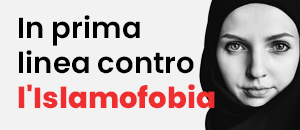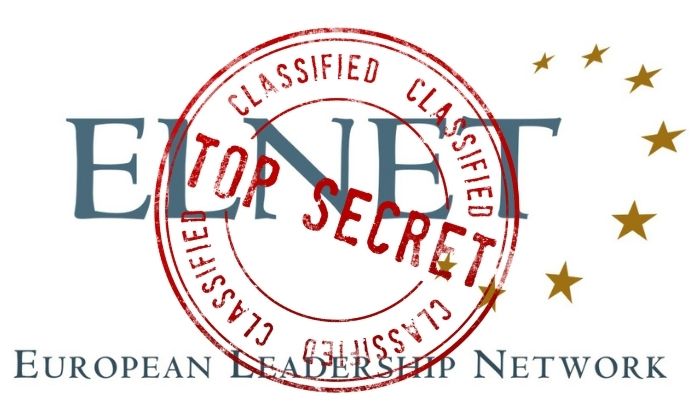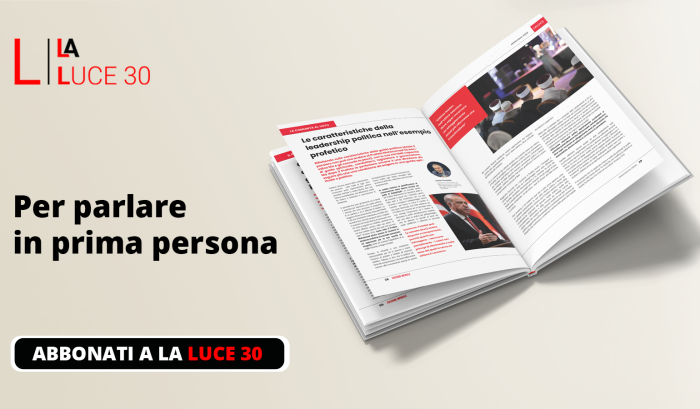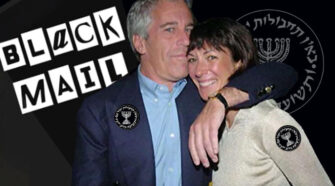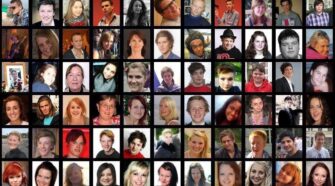A powerful pro-Israeli lobby, disguised as NGO, that works in Brussels following the features and objectives of the American AIPAC, is presented as a non-profit organization, but instead has very clear links with the establishment in Tel Aviv and a large group of former Israeli diplomats are among its ranks.
ELNET describes itself as a “non-profit organization dedicated to strengthening the relations between Europe and Israel, based on shared democratic values and strategic interests” but even a brief analysis of ELNET’s work is enough to understand how different the reality is.
The goals of ELNET, in fact, go beyond the usual purposes of non-profit organizations. Their pamphlet shows that among the supporters of the organization there are the former Ambassador of Israel to the EU Ran Curiel and the former Israeli Minister of Intelligence Yuval Steinitz.
The main objective of ELNET appears to be “educating” about Israel; this objective is pursued through the creation of a Zionist-oriented interest group in Europe at the highest political and economic level.
According to the organization’s analysis of the effectiveness of lobbying, the difficulty is about influencing European policies from abroad, which is the reason why ELNET was chosen as a European NGO.
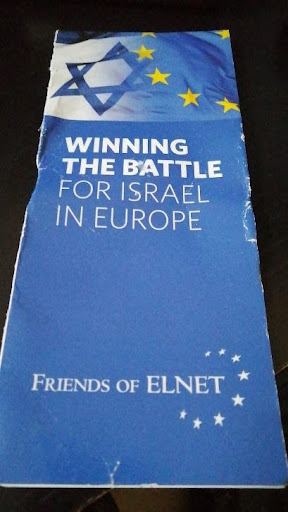
The areas of interest are the “national security and foreign and military affairs”.
ELNET also aims to create a cluster of local offices in Europe, totally independent from European funding sources.
The “informative” tour offered by ELNET looks at the top, not only in the upper echelons of politics, but also in journalism; a process of influence that reaches its peak with the structured Dialogues that take place in Israel and Europe, where discussions and decisions are made in a “confidential” way, as the self-proclaimed non-profit organization recalls.
What are the official reasons that push ELNET to make this investment? There are two reasons and they are not related to peace, dialogue or anything else like this:
1- The EU is the Israel’s largest trading partner with a volume of 25 billion Euros per year, as stated by ELNET.
2- The influence of EU in the Middle East has reached a high level, leading to eliminate any critical voice against Israel in the upper echelons of the European institutions.
Among the actions promoted by ELNET is the adoption, by each European State, of the definitions of the IHRA, the International Holocaust Remembrance Alliance, which the European Commission has already defined as legally and juridically non-binding: but ELNET aims, instead, at the de facto acceptance of these definitions. While these definitions are to a large extent important and legitimate, they are also highly politicized, in some key points, for example by defining criticism of Israel’s legitimacy as anti-Semitism tout court. Italy adopted the IHRA definitions in 2020.
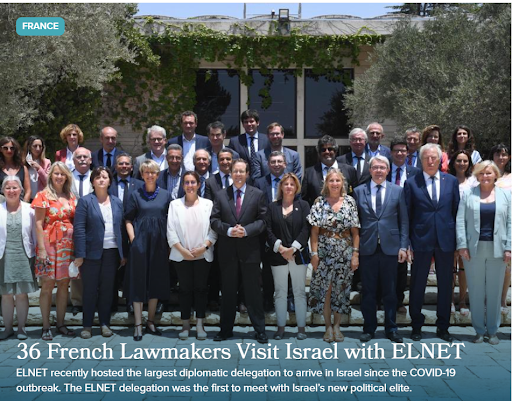
ELNET also wants to influence stakeholders with economic leverage and, in practice, it does so through the ELNET Business Club, which formally isn’t part of the organization but in reality has a very strong bond with it. The Business Club carries out “consultancy” work to attract those who would like to cooperate with ELNET’s mission with money and profit opportunities.
ELNET has recently started to bring high-level profiles to Israel as part of its “exchange of ideas and religious visits”, including several European legislators (36 French, for example). This is how ELNET describes the meeting with 36 European legislators:
“[The participants were] Israeli Prime Minister Naftali Bennett, President Isaac Herzog, President of the Israeli Parliament Michael Levy and opposition leader Benjamin Netanyahu. The visit included the Yad Vashem, Jerusalem’s holy sites and Israel’s southern border with Gaza, as well as a visit to an Iron Dome air defense battery and meetings with local officials, including the mayor of Sderot. Professor Ran Balicer, head of Israel’s advisory committee on COVID-19, briefed lawmakers on Israel’s worldwide vaccine campaign and efforts to combat the pandemic”.
ELNET justifies its work by stressing about a phantom urgency and the immediate need to strengthen Israel’s role, also against Islam, talking about the risks for Israel arising from the immigration of Muslims, and therefore anti-Zionists, to Europe.
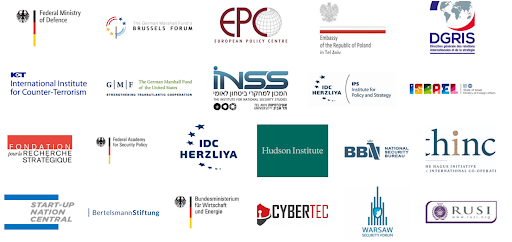
To dispel any doubts regarding the scope of this organization, it’s useful to show which partners this self-styled non-profit has managed to attract. These come mainly from the European defence and intelligence sector, such as the German Federal Ministry of Defense and others.
But when was ELNET born and why did no one ever mention what is being called the AIPAC of Europe? The reason is simply that ELNET wants to keep a low profile while taking root in Europe. Emblematic are the words of the famous Jewish media outlet Forward which, in a 2008 article written by Nathan Guttmann, entitled “New European pro-Israel group aims low profile”, described ELNET in this disturbing way:
“Unlike the American tradition of highlighting contributions to politicians and public causes, many Europeans prefer to maintain a separation between money and politics, at least formally. This traditional separation has hampered pro-Israel advocacy efforts in the past, as it was more difficult to find funding in Europe”.
And again: “Europeans are not so open to the idea”, said Eliaz. “They feel uncomfortable giving money for political advocacy”.
“Such considerations weigh little on the minds of American Jewish donors, and it is to them that ELNET is turning for help in promoting efforts to empower local pro-Israel leaders and educate Europeans in political advocacy”.
“If each of the groups like ours working in Europe had 10% of the budget that pro-Israeli lobby has in the United States, we could change the world”, Eliaz said. “We could change European politics and make them more cooperative on our issues”.
“Eliaz, 33, spends his time between Israel and Brussels, where ELNET’s headquarters are located. His first glimpse of pro-Israel activity was in Aipac’s Washington offices, where he dealt with European issues. He later worked at the Israeli National Security Council as an expert on Europe”.

The icing on the cake is the fact that the head of ELNET in 2007, the first important year of the self-styled non-profit, was Raanan Eliaz who first dealt with European affairs at Aipac and then at the Israeli National Security Council. Today, it’s not a surprise to find Shay Bazak as Chief Executive Officer (CEO), with 25 years of experience in Israeli diplomacy, Shani Aharon Busin, ELNET’s chief of office and former chief of office of the Israeli ambassador to France, and many others high-ranking people who have little to do with the non-profit field.
Needless to say, how serious are the actions of ELNET, which appears to be the longa manus of Israeli politics disguised as NGO. The objectives of this Israeli pseudo-ministry in Europe are totally governmental and geopolitical, with a colonialist and Islamophobic component.
Given the European laws on funding for political groups, there is an urgent need for total transparency regarding the work of ELNET and the management of its direct and possibly indirect finances, as befits any non-profit organization on European soil.
In conclusion, the call to European governments and EU institutions, as well as to the different media and non-profit activist groups, is to bring to light many areas of doubt about ELNET and its work on European soil and in Israel, through our legislators.
Finally, here are the disturbing figures of ELNET to date:


